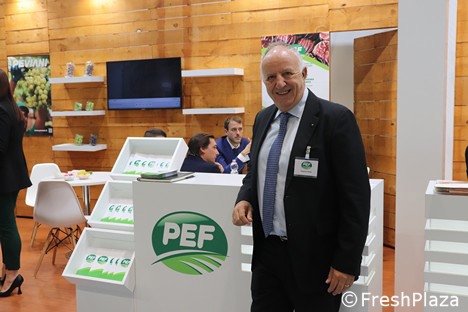A meeting of the Tomato Contact Group took place at Fruit Attraction 2022, bringing together the four major European countries involved in the production of tomatoes, namely Spain, Italy, France and Portugal.
Four main topics were on the agenda:
- the 2021/22 campaign budget;
- the 2022/23 forecast campaign;
- an analysis of the foreign competition in EU and UK markets;
- health issues (Tomato Brown rugose Fruit Virus = TOBRFV) and phytosanitary issues.
The meeting was also attended by Massimo Pavan, a well-known Italian fruit and vegetable agri-manager who, in an interview, summarized the contents of the international meeting, from the perspective of the individual participating countries.
 Massimo Pavan
Massimo Pavan
Budget Campaign 2020/21
"Regarding the first issue on the agenda," Pavan began, " the datum that is common to everyone in the meeting is the disproportionate increase in production costs. The Spanish counterparts, for example, have complained of a +25% incidence for net production costs alone, to which must be added a +28% for supply chain costs (processing, refrigeration, transport, packaging etc.). Last year, Spain recorded a -20% decrease in the areas of conventional/integrated production, compared, however, with a 16% growth for those in organic regime. France, on the other hand, recorded the largest energy increases of 300% because greenhouse crops are heated. The digit also contains increases, to a lesser extent, for pesticides. At the same time, greenhouse areas increased by 3%, while field areas dropped by 8%. Substantially different is the situation in Portugal, which has a production calendar purely confined to May through November, whose increases have been offset by higher selling prices. Over the past 5 years, the Lusitanian production has seen a +5% increase in greenhouse areas and, in general, has risen from 65,000 tons to 110,000 tons. These are volumes whose destination are almost exclusively the Spanish markets."
Forecast 2022/23
"Spain will see an increase in tomato areas of 15 percent," the expert continued. "After years experiencing a planned decrease, an expansion is expected next year due to the need to compensate for the demands of the European market. As for France, the biggest problem for the coming season will also be the costs for heating, so it is difficult to make forecasts. As such, the sector is waiting for measures from Paris so that energy costs can be reduced. If this does not happen, there will most likely be a shift to transplants for seasonal harvests even for greenhouse crops. On the other hand, Portuguese production will remain unchanged, with areas remaining essentially the same."
Foreign competition in EU and U.R. markets
"This is always a hotly debated point," reported Massimo Pavan, "because it brings us to the heart of each country's economic interests. While the European countries are feeling a more or less pronounced slowdown, competitors continue to grow at double-digit rates. Morocco has grown by 17 percent and Turkey by 12 percent in exports to the main European markets, in a context that sees the United Kingdom, along with Germany, increasing supplies precisely from the Maghreb and Turkey. During Brexit it was agreed, at a European scale, to mitigate imports from non-EU areas, but the opposite has happened. It is incomprehensible how different ethical production standards, combined with phytosanitary standards, fail to elicit any restraint on these trade dynamics. France has made no secret of its stance against Morocco for unfair practices, including the sale of Maghrebi tomatoes packaged with flow pack that recalls the tricolor from beyond the Alps and an inscription that would have a print character of less than 1mm (where instead the actual African origin is declared). In short, this would be deceitful advertising and would therefore be unfair competition, leading the consumer astray. Portugal from this point of view has not reported problems, because it has no winter production."
Phytosanitary issues
"That which until a few years ago was the number one problem for tomato producers," said the Italian agri-manager, "today seems, more or less for all the producing countries, to be an issue that is under control or, at least, better manageable and less worrisome. By contrast, Portugal is lamenting a massive presence of Tuta absoluta on tomatoes and excessive restrictions on the use of pesticides; it is therefore asking its government to bring regulations in line with those of the other producer countries that are present. On the other hand, an issue that Spain was keen to raise and that was widely shared among those present was the reduction by 2030 of 50 percent of active ingredients, imposed by the EU. The Farm to Fork is proving to be difficult to implement without the risk of heavy downsizing of production yields. To be more precise, conducting Farm to Fork without the existing means, would result in further increases in production costs that would make farming for many farms economically unaffordable or with prohibitive retail prices."
